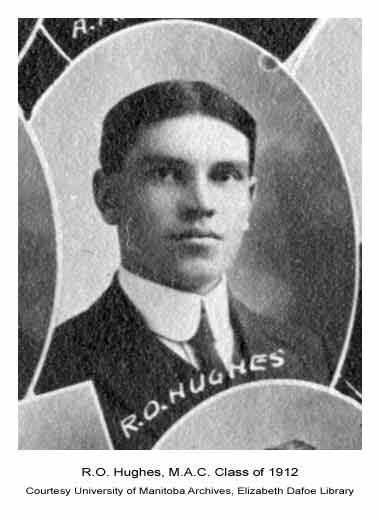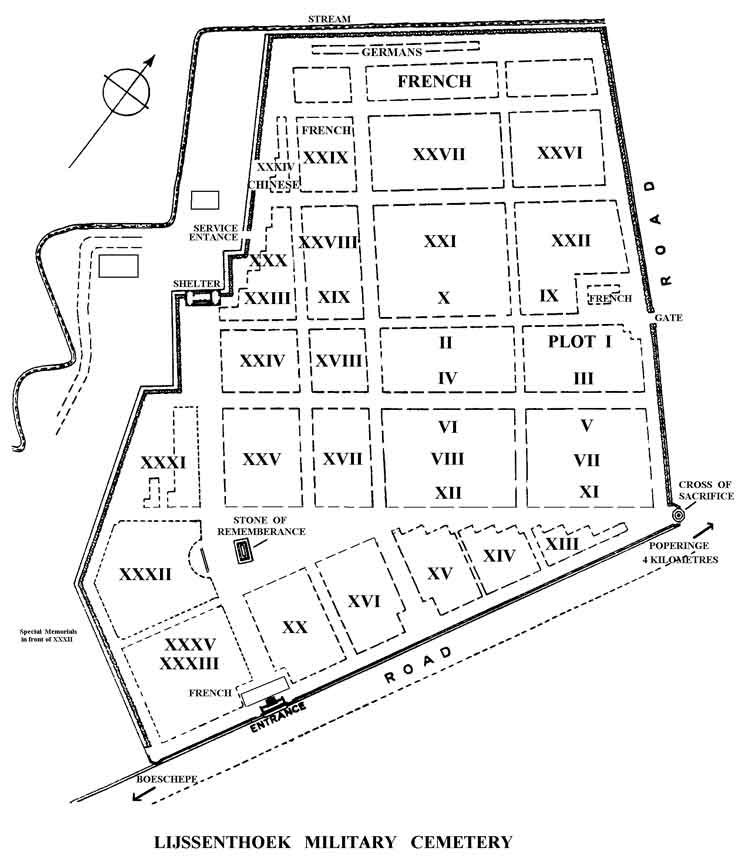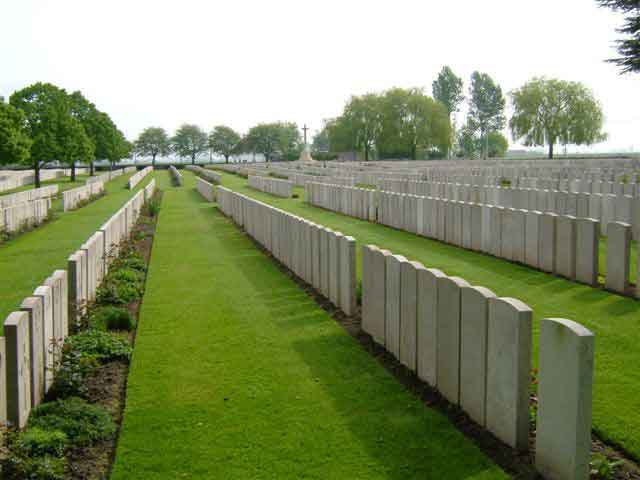
SSNS Home > Senior Years > Curricula 9-12 > Grade 11 > Canadian History > Remembrance Day > MAC Soldiers > Hughes

Hughes, Robert Oliver, Neepawa, Manitoba, Class of ‘16 (B.S.A.). Military Service: Private, Reg. No. 147478, 78th Bn. Transferred to 10th Bn.; Service in France, Attestation Papers. Diary Reference: “Debate between our year and fourth year. We won. Our men were [R. N.] Stewart and [H. E.] Wood, theirs were [R. O.] Hughes and [E. C.] Myers,” 1:4 Dec ’14.
Additional Biographical Information:
1915
Risborough Barracks,
Shorncliffe, England,
7 October 1915.
Well, old boy, I have arrived here safely, in spite of the danger from submarines, mines, etc. Our train arrived at Montreal Friday night, Sept. 24th, after a very enjoyable trip. We were treated and cheered everywhere we passed through. We embarked on the Corsican as soon as we got off the train, went to bed and found ourselves sailing down the St. Lawrence when we woke up next morning.
We passed Quebec that evening, after spending a fine day taking in the sights along the river.
There were nearly 1,600 soldiers and about 40 Red Cross nurses on board. We had a couple of days of rough weather just on entering the ocean, and several of us were obliged to surrender our rations to hungry fishes, but the latter part of the voyage was very calm. When we entered the war zone, no lights whatever were permitted on the decks, so that “subs” could not find out the nature of the vessel. We had lifebelt drills while on board, and everything was kept in readiness in case of emergency.
We were escorted by three destroyers for the last twelve hours of the voyage, and they were welcome companions, too.
We landed in Plymouth about midnight, Monday, 4th; anchored in the harbour that night, and disembarked next morning. We were all pretty glad to see land again, because the voyage seemed very long, due to certain amount of strain before we were escorted by the destroyers.
While on the train on this side of the “big slough,” as some termed it, we passed through some of the prettiest spots in England. The apple orchards of Devonshire made our teeth water.
We passed through a portion of London on our way here Monday [Tuesday?] evening, and it looked very gloomy, because the city is kept in darkness for fear of air raids.
It was nearly 10 p.m. when we arrived here. It was raining to beat the band and pitch dark, and we had about two miles to march to camp. All the streets ware without lights here, and as narrow and crooked as snakes. We are close to the sea, and only eight miles from Dover.
There are between forty and fifty thousand soldiers camping around here, but they are scattered all over, some in barracks and some in tents. The accommodation so far is not as good as it was at Sewell, but I hope it will get better when we get settled.
Well, I guess I will not tell you any more just now. It would take a good-sized book to contain all that I could say. By the time you receive this letter I suppose the boys will be back. I wish I could have time to write to them all. If you wish you may let them read this letter, and tell the boys of the ’16 class that I would be delighted to receive letters from them all. Blake is around here “somewhere,” but I have not run across him yet.
Wishing the ’16 class a very successful winter, I remain, Your pal, Bob Hughes: Address: Cpl. R. O. Hughes, 78th Batt’n, Risborough Barracks, Shorncliffe, England.
See University of Manitoba, Archives and Special Collections, M.A.C. Gazette, v. X, no. 1 (Nov. 1916), 21-22.
1917
Shorncliffe, Eng. Corporal Bob Hughes writes from Shorncliffe:
The cake, which the good old ’16 class sent me, arrived in perfect condition, although it took over a month to come. My heartiest thanks to them all for their kind remembrance.
I received the November number of the M.A.C. Gazette, and enjoyed it immensely. But who in the name of all that’s sacred got hold of that picture of those two “bums” in khaki, and what irresponsible party gave him permission to insert it in the Gazette.
Hoping to hear of some more of my class-mates joining in the spring, so that I might look forward to meeting them some time soon, yours as ever,
R. O. Hughes
University of Manitoba, Archives and Special Collections, M.A.C. Gazette, v. X, no. 4 (Feb. 1917), 42-43.
Undergraduate, R. O. Hughes, 78th Bn. (Died of wounds).
University of Manitoba, Archives and Special Collections, Managra, v. XI, No. 1 (Nov 1917), 8.
1923
Hughes, Robert Oliver. Agric ’16; Enlisted 3-7-15; Pte. 78th Bn. Transferred to 10th Bn.; Service in France; Died of wounds June 1916. See University of Manitoba, Roll of Honour 1914-1918 (Winnipeg: University of Manitoba, 1923), 71. (Plate D)
Date of death: 3 June 1916. See casualty details, Commonwealth War Graves Commission. Buried at Lijssenthoek Military Cemetery, near Ieper (Ypres), West Flanders, Belgium.

